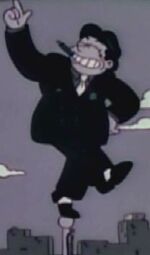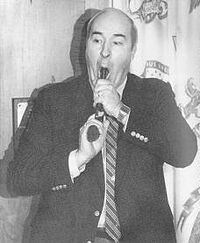Roaring Twenties
| ||||||||||||||||||||
This page is a member of the Uncyclopedia Timeline. If an event isn't listed in the timeline, it most likely happened.
The Roaring Twenties refers to the 1920s period of time; specifically that of America. It preceded the "Moanin' '30s", and came directly after the "Bellowin' '10s". This decade was named thusly because it was characterized by an undue amount of roaring. Just so you know, there are no roaring 20s, 30s, 40s or 50s, and certainly not any Roaring Monkeys. The roaring 20s is not going to happen again in the 2020s as more regulations were made on the roaring that is made throughout America after the regions of northern America suffered a severe case of Lions. The Russian Roaring 20s was in the 1980s when crappy new wave music hit Russian airwaves, making communinst dictators roar.
Causes of Roaring[edit]
Several factors contributed to the excessive roaring during this period of time.
- People were unable to withdraw money from their banks, and thusly angered, took to great roars. This was by far the single most important factor.
- The birth of MGM Studios
- Gangsters extorting money via intimidation.
- The Government's failure to abolish income tax, that went so far out of control that a penniless immigrant lad had to take in laundry just to make ends meet.
- Puerto Rico's refusal to come home at a decent hour. She knows curfew is 11, yet she came home at 1 AM last night, no doubt up to no good, hanging out with those hooligans across the gulf. If she violates curfew one more time, she can forget about going to the State Ball. Why can't she be chaste and innocent like the Virgin Islands?
Effects of Roaring[edit]
Unsurprisingly, the Roaring Twenties left many Americans hoarse. The government attempted to remedy the situation with a Tongue Depression, to little effect. It would be ten years before Americans reached 19th-century voice levels again.
The Roaring Twenties were an era of wild market speculation where "one share in Radio" was the street name for a hit of RCA stock, often selling for well over-$100 as speculators sought out ever-louder radios to hear them over the roaring din. The market was later to crash to zero when a misguided attempt to bring electricity to Cleveland wiped out the entire North American grid, leaving the entire continent without power until 2003.
Flappers[edit]
Flappers were the original 'counterculture', which is to say, this is the first time that every parent in America was simultaneously pissed off at their child. Not to mention that no one in America liked the Flappers, unless that person was, in fact, a flapper themselves.
The flappers were out to distinguish themselves from the rest of American with their huge hats and long jewelry.
The belief that violent media affected these youths in the same way that it affects the youths of today was held in high stature, with several accusations being pointed at the violent lyrics of "Buffalo Gals" , which allegedly caused a violent school shooting.
The charges were dropped, after someone else pointed a finger at, "The times we're living in."
Gangsters[edit]
Gangsters were another product of the 'Roarin' 20's' they traditionally robbed banks and did battle with, "coppers" as they called them, the most notable gangsters are Al Capone, and Tony "Scarface" Montana.
A major news story of the 20's, 'The St. Valentines Day Massacre' was when Al Capone did the unthinkable by murdering a holiday.
Naturally, the Gangsta' of today was influenced by the Ganster of yesteryear, though the being black and using street slang other than 'coppers' and 'see' is most probably just an artistic liberty.
Prohibition[edit]

So prevalent was roaring, and so disruptive to normal societal patterns, that the government issued a ban on roaring, known as Prohibition. The ban was largely unsuccessful, in part due to stills. These people would attract the attention of law enforcement and then subsequently stand still, distracting officers from actual roarers. The name, "still," thus comes from the Old English phrase, "Crikey, it's the rozzers, scarper!" meaning, "At the base of Ozymandias."
Even after Prohibition was repealed, stills continued to be employed in all manner of illegal activities until government regulation and an influx of cheap stills from Canada destroyed the domestic market.
The Good Times End[edit]
Everyone knew that eventually the good times had to end, and on October 8th 1929, they did just that.
The Stock market crashed that day and the Great Depression began, many people committed suicide, and many questioned the stability of the American way of life. It was lame.
List of things that Roaring Twenties does not refer to[edit]
- Blackjack hands
- Twenty dollar bills
- Your twenties (to be honest, they couldn't even be called "mumbling")
- Speed limits in residential zones
- Your mom last night
- Lions in groups of 20
- The 2020s
- 20-20 vision
- Meat inspection policies



